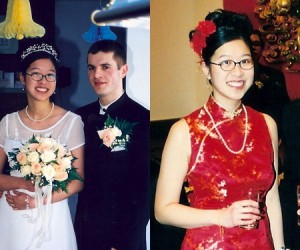By Denise Balkissoon (well, by all of the brides, actually)
For many, The White Dress is an essential piece of the wedding, symbolizing everything from a massive new commitment, to celebrity status for a day, to long-guarded virginal purity (ha). But for mix-and-match Torontonians, those traditions often dovetail with others, which are also marked with fancy dress. Here, some local brides talk about why they chose to wear both a white gown as well as an outfit with different cultural meaning.
I have always wanted to wear the traditional Hindu wedding sari, even though later in life I became a born again Christian. Growing up in a Hindu home and attending many Hindu weddings, I fell in love with the designs, colours and accessories. I remember being a small child and seeing one of my elder cousins in the traditional red sari walking down the stairs to meet her groom, having the veil of flowers hanging on her face. From that moment I knew that is what I wanted to wear at my wedding. My spouse is not of my culture but he welcomed my ideas and so did our wedding party. I chose to wear baby yellow, as the traditional wedding colours are red or yellow.
We were married in a church and our pastor was very excited that although were we being married under Christian rites, other cultures and traditions were still being represented in our clothing. My pastor and his spouse also wore traditional Indian outfits at our ceremony. After the ceremony, we changed into the traditional white dress and white suit for the remaining of our pictures and for the reception. Honestly, if I could dance in a sari, I probably would have continued to wear that throughout the night!

